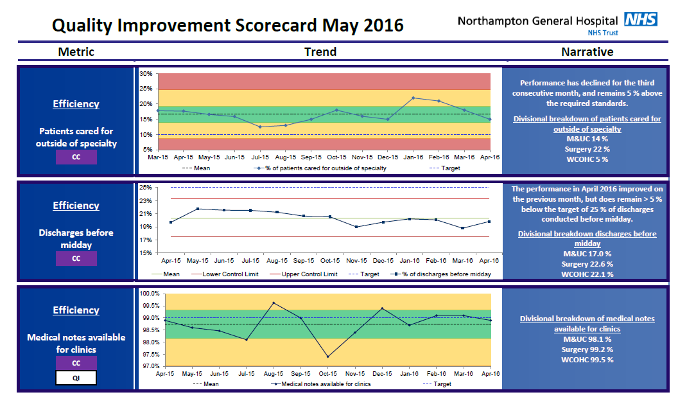Q member Sid Beech shares his QI journey and invites you to join the new Coaching Improvement Special Interest Group to help co-design the programme.
How and why did you first get involved in improvement and what has been your journey since then?
I first got involved in QI after being asked to support the development of a ‘Quality Improvement scorecard’ for Northampton General Hospital in 2014. At the time I was working in analytics/business intelligence and was called in as a favour for Jane Bradley, the Patient Safety Lead in the hospital. Jane had been my mentor in QI until her retirement last year and continues to inspire me to role model QI in everything I do, and to act as a caring and compassionate leader.
In 2014, Jane was a ‘lone-wolf’ and the sole advocate for QI in the hospital. She wanted to modernise the way key safety and improvement data was reported at a board level, with the aim of shifting board members’ attitude to QI and adopting a more proactive approach to improvement. Together we produced a monthly scorecard that moved away from RAG and reported key metrics via run and SPC chart – something that was quite innovative at the time in NHS England.

That short introduction to the world of QI had me hooked, and since then I’ve worked in various QI roles in the acute and community setting. I’ve been fortunate to work in very practical roles supporting, facilitating and coaching improvement at the front line, as well as working in more academic and education-focused roles.
What most inspires you professionally?
There are two main reasons why I love working in QI.
Firstly, the real and tangible benefits QI brings to patients. I’ve been privileged to have been involved (in some way) in hundreds of improvement projects over the past five or so years. Not all have worked (there’s still more we as a community need to do to overcome this), but those that have worked have had a significant impact on patient care… and isn’t that why we are all here?
Secondly, I love teaching and coaching others in QI because I get to experience the joy, satisfaction and pride felt by front-line staff leading successful QI work. Seeing people grow and develop in their QI skills and abilities, as well as witnessing their achievements, is an honour. Fortunately, this isn’t a thankless task; healthcare staff are always so thankful and appreciative of any support we provide – even with the smallest of things! QI can be infectious and giving people the ‘QI bug’ brings me a lot of joy.
What change could we make that would do most to embed continuous improvement in health and care?
As part of this I am plugging the new Coaching Improvement Special Interest Group, so of course I should say: developing a new generation of improvement coaches throughout the NHS and health sector!

We’re at a stage now where most NHS providers have a skilled QI team – a significant milestone that we’ve all worked hard for. However, we can’t stop here. Having a QI team often isn’t enough to support QI at every level, every day. The next step is to relinquish control of QI and entrust frontline staff with bottom-up improvement. The ideal situation would be a workforce who are highly skilled in and adept at QI, with appropriate support systems in place at a local level to support QI in situ. In other words, the next step is to do ourselves out of a job! Of course, this ideal state would still require an expert QI team, who support improvement networks, deliver large programmes of change and continue to train staff in QI.
Secondly, as I alluded to earlier, we need to think more about why and how QI work ‘fails’. More time and consideration needs to be given to how we address this and support individuals and teams with successful QI work. Perhaps someone with this expertise can share this widely throughout Q?
More time and consideration needs to be given to how we address this and support individuals and teams with successful QI work
Why did you join Q?
If I am being honest – because my manager and mentor made me! They recognised the importance of networks in healthcare, and particularly in QI. QI is such an interdisciplinary and intersectional field and we each have our own unique interests and areas of expertise. Sharing our knowledge and experiences is important to the success of QI. Through Q I’ve met many brilliant and fascinating people who have inspired me to learn more and do more to improve the care we provide.
Can you tell us about something you’re currently working on that Q members might be able to contribute to?
Yes, we’re looking for organisations that would like to pilot and test the teaching materials from our coaching programme.
The 2019 Q Exchange project ‘Quality Coach Development Programme’ has progressed significantly in the last few months. We are co-designing the programme with Q community members, pooling our experience and expertise in the interrelated fields of improvement, coaching, leadership, measurement and change management, in order to design high-quality teaching materials. The end result will be a free-to-use ‘grab-and-go’ teaching resource to support the development of improvement coaches throughout the NHS. We hope that Q members will use this programme to further develop improvement capability and capacity at a local level within their organisations, as well as at a system level.
If you’d like to get involved, join our Coaching Improvement SIG and add a post to express your interest.